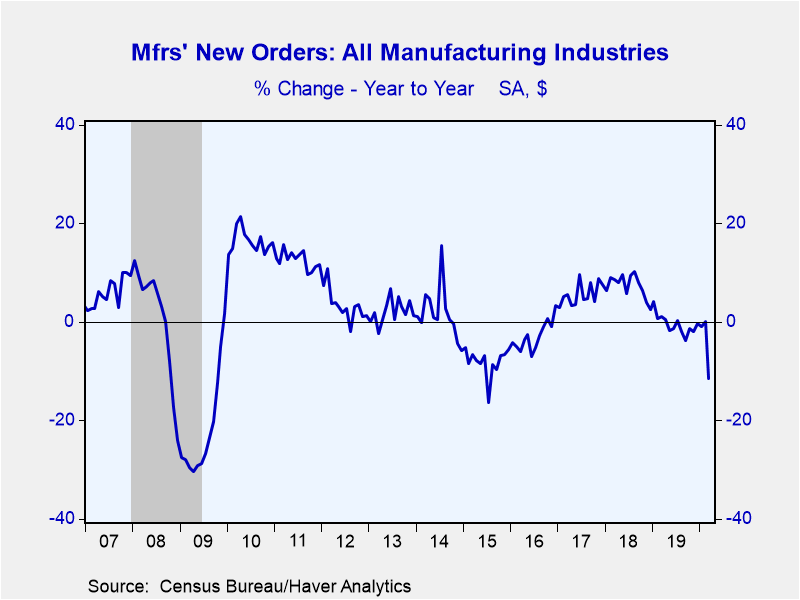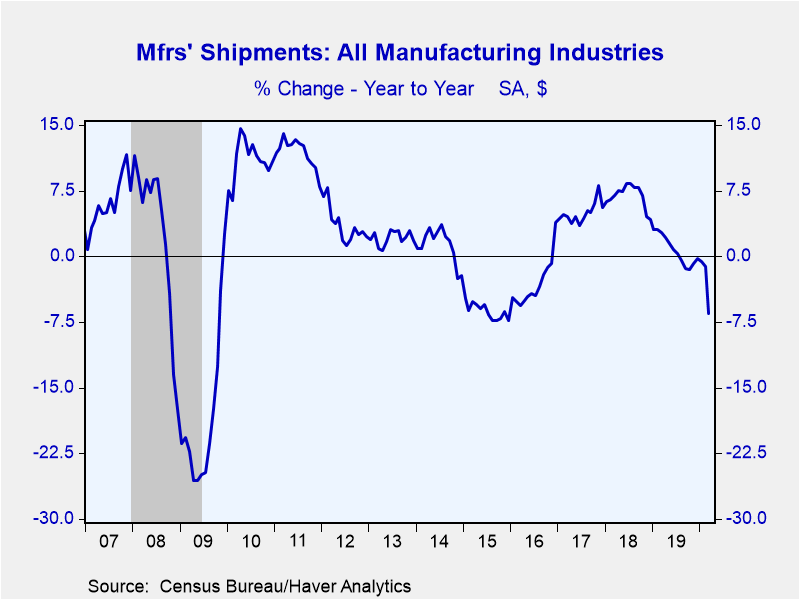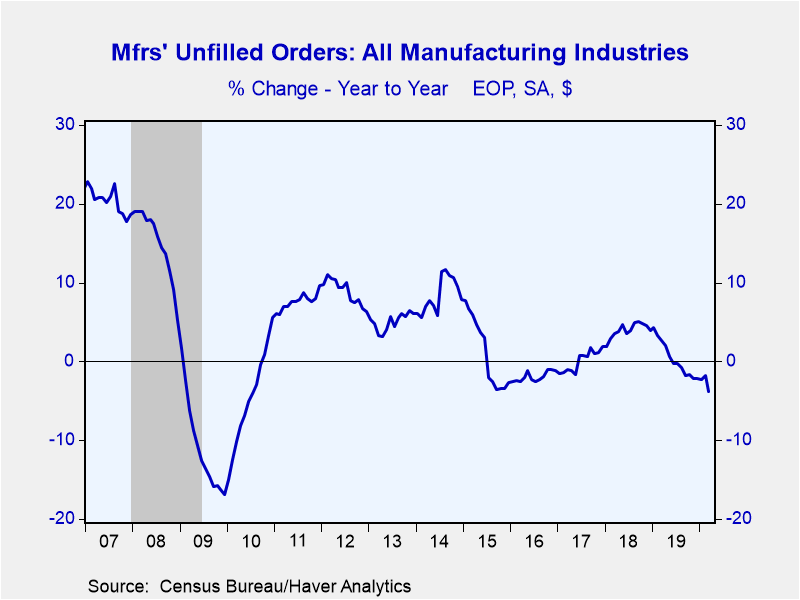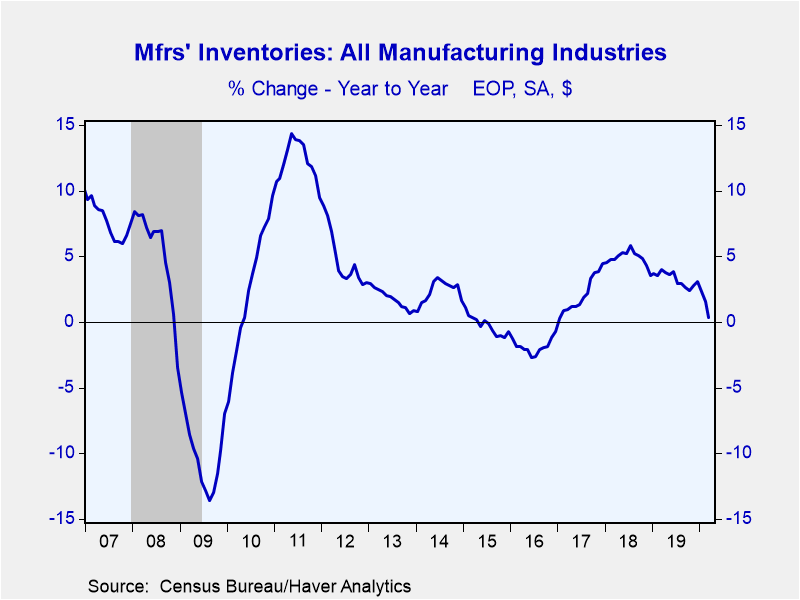 Global| May 04 2020
Global| May 04 2020U.S. Factory Activity Sector Activity Weakens Substantially
by:Tom Moeller
|in:Economy in Brief
Summary
• Factory orders decline led by durable goods. • Shipments & unfilled orders drop markedly as well. • Inventory liquidation progresses. Mirroring the weakness reported last month for durable goods orders and industrial production, [...]
• Factory orders decline led by durable goods.
• Shipments & unfilled orders drop markedly as well.
• Inventory liquidation progresses.
Mirroring the weakness reported last month for durable goods orders and industrial production, each component of factory sector activity declined in March. Factory orders dropped 10.3% (-11.4% y/y) during March following a little-revised 0.1% February dip. A 9.7% decline had been expected in the Action Economics Forecast Survey. Durable goods orders declined 14.7% (-16.2% y/y), revised from -16.2% in the advance report, following a 0.1% easing. A 41.3% decline (-43.9% y/y) in orders for transportation equipment was led by a record collapse in civilian aircraft bookings. Excluding the transportation sector altogether, factory sector orders fell 3.7% (-4.3% y/y), the third consecutive monthly decline. Primary metals orders weakened 2.8% (-8.1% y/y) and machinery orders eased 0.5% (-1.5% y/y). Orders for nondurable goods, which equal shipments, collapsed 5.8% (-6.5% y/y), led by a one-third drop in the value of petroleum products. Basic chemical shipments eased 0.3% (+1.1% y/y) and apparel shipments declined (-1.9% y/y). Textile product shipments were off 1.8% (-7.9% y/y).
Shipments of durable goods fell 4.7% (-6.6% y/y) as transportation shipments weakened 13.0% (-17.4% y/y). Shipments outside of the transportation sector fell 3.6% (-4.2% y/y). Machinery shipments dipped 0.3% (-2.9% y/y) but electrical equipment & appliance shipments improved 1.3% (3.7% y/y), a second straight month of strong increase. Transportation sector shipments collapsed 13.0% (-17.4% y/y) as auto shipments fell by one-third (-36.8% y/y). Nondefense aircraft shipments rose 13.1% though they remained down 20.5% y/y. Shipments of computers & electronic products eased 0.2% (+0.2% y/y).
Unfilled orders for manufactured products fell 2.0% (-3.8% y/y). Transportation sector backlogs declined 2.9% (-5.3% y/y). Excluding transportation, unfilled orders eased 0.2% (-0.5% y/y). Machinery backlogs held steady (-3.0% y/y) while computer & electronic equipment order backlogs rose 0.1% (0.5% y/y). Electronic equipment & appliance order backlogs strengthened 0.2% (7.0% y/y).
Factory sector inventories declined 0.8% (+0.3% y/y), the largest of three straight monthly declines. Transportation equipment inventories rose 0.6% (13.4% y/y). Excluding the transportation sector, inventories declined 1.2% (-2.8% y/y). Electrical equipment inventories improved 0.3% (0.1% y/y) while computer & electronic product inventories gained 0.4% (0.3% y/y). Nondurable product inventories fell 3.2% (-5.3% y/y) as the value of petroleum refinery stockpiles dropped by roughly one-quarter (-29.8% y/y). Apparel inventories eased 0.2% (-4.6% y/y) and food product inventories fell slightly and were unchanged y/y.
The factory sector figures are available in Haver's USECON database. The expectation figure is in the AS1REPNA database.
| Factory Sector (% chg) - NAICS Classification | Mar | Feb | Jan | Mar Y/Y | 2019 | 2018 | 2017 |
|---|---|---|---|---|---|---|---|
| New Orders | -10.3 | -0.1 | -0.5 | -11.4 | -0.5 | 7.3 | 5.7 |
| Shipments | -5.2 | -0.3 | -0.6 | -6.5 | 0.7 | 6.9 | 5.0 |
| Unfilled Orders | -2.0 | 0.1 | 0.0 | -3.8 | -2.1 | 3.9 | 1.9 |
| Inventories | -0.8 | -0.4 | -0.3 | 0.3 | 3.1 | 3.5 | 4.5 |
Tom Moeller
AuthorMore in Author Profile »Prior to joining Haver Analytics in 2000, Mr. Moeller worked as the Economist at Chancellor Capital Management from 1985 to 1999. There, he developed comprehensive economic forecasts and interpreted economic data for equity and fixed income portfolio managers. Also at Chancellor, Mr. Moeller worked as an equity analyst and was responsible for researching and rating companies in the economically sensitive automobile and housing industries for investment in Chancellor’s equity portfolio. Prior to joining Chancellor, Mr. Moeller was an Economist at Citibank from 1979 to 1984. He also analyzed pricing behavior in the metals industry for the Council on Wage and Price Stability in Washington, D.C. In 1999, Mr. Moeller received the award for most accurate forecast from the Forecasters' Club of New York. From 1990 to 1992 he was President of the New York Association for Business Economists. Mr. Moeller earned an M.B.A. in Finance from Fordham University, where he graduated in 1987. He holds a Bachelor of Arts in Economics from George Washington University.
More Economy in Brief
 Global| Feb 05 2026
Global| Feb 05 2026Charts of the Week: Balanced Policy, Resilient Data and AI Narratives
by:Andrew Cates










